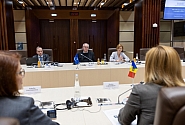
From 26 to 28 May, Deputy Speaker of the Saeima Zanda Kalniņa-Lukaševica visited Moldova as part of a fact-finding mission for the Parliamentary Assembly of the Council of Europe (hereinafter – the Assembly) in preparation for a monitoring report. The aim of the working visit was to assess Moldova’s compliance with the commitments it undertook upon joining the Council of Europe in the areas of democracy, human rights, and the rule of law.
“It is time for Latvia to take proactive measures to strengthen the resilience of its democratic values and institutions against foreign interference. We must heed Moldova’s experience—before it is too late,” stated Zanda Kalniņa-Lukaševica following her visit.
During the visit, the Deputy Speaker met with Speaker of the Parliament Igor Grosu, Prime Minister Dorin Recean, Minister of Justice Veronica Mihailov-Moraru, and other representatives of parliament, the government, the Office of the President, national security institutions, and civil society organisations. The discussions focused on the main threats to democracy, including foreign interference aimed at manipulating elections, sowing division in society, and eroding public trust in state institutions.
“Last year, Moldovan citizens voted in favour of Moldova’s aspiration to join the European Union. Parliamentary elections are scheduled for this autumn. In 2024, Russia sought to influence the outcome of the referendum through a variety of methods—blatant vote-buying, disinformation, intimidation, and economic and political pressure. A significant role in these efforts was played by former oligarchs who once held sway in Moldova and maintain ties to Russia. This year, attempts by Russia and its agents to influence the elections are intensifying. New tactics are being deployed, illegal funding continues to flow, and the vulnerabilities of social media algorithms are being exploited,” the Deputy Speaker noted.
She stressed that Latvia must not wait for a moment when its political environment could be seriously impacted by hostile foreign forces whose true goal is to dismantle Latvia as a democratic state. “Moldova is sounding a warning bell for the entire region. Russia’s tactics have not changed—divide, deceive, manipulate. The only difference lies in how ready we are to defend ourselves,” Kalniņa-Lukaševica emphasised.
The Deputy Speaker highlighted the essential role of both the media and public institutions in countering disinformation. She underlined the need to strengthen the capacity of Latvia’s media and state authorities in this area, to review political campaign financing oversight mechanisms, enhance the public administration’s ability to assess influence risks, improve media literacy across society, and engage more actively in European-level dialogue on democratic resilience.
In this context, Kalniņa-Lukaševica intends to initiate a national discussion on these topics to ensure they receive the attention they deserve and to identify the best approaches for strengthening democracy in Latvia.







